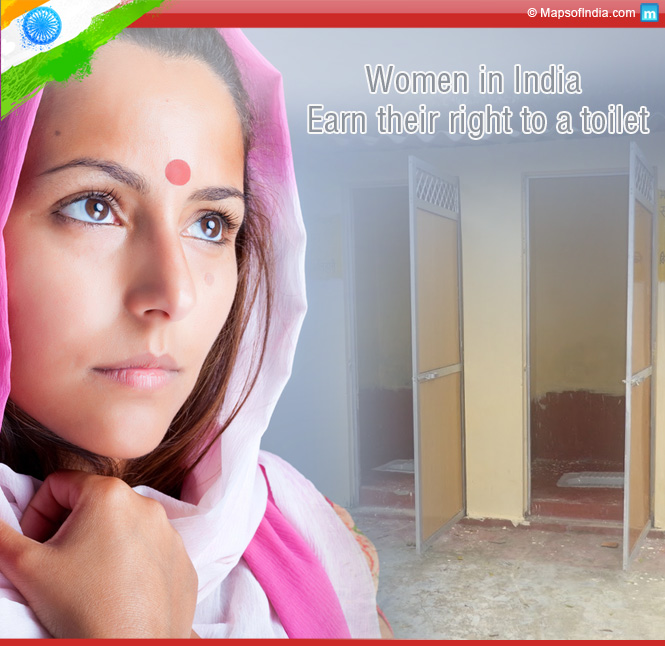It’s taken 67 years since Independence for women in India to earn their right to a toilet. It is surprising that it has taken so long for a basic and fundamental necessity like a toilet at home to take centre stage in the national consciousness and Narendra Modi can take full credit for identifying a sensitive issue and bringing it to the forefront of national priority.
According to WHO and UNICEF, around 65% of the population living in the villages defecate in the open. This gives rise to medical issues as a result of poor personal hygiene. Several studies on people who defecate in the open in underdeveloped countries, have shown a direct co-relation between rise in diseases of these people when compared with those who used toilets at home.
In India, going out to the fields after dark has resulted in girls and women being molested and raped. While the situation in villages and interior India is pretty bad, the situation in urban slums of Delhi and other metros is no better. Girls as young as two and three have been raped while going to the open fields after dark and cases of rapes of all age groups keep getting reported in the media. So it is a matter of shame that it took so long for such a basic issue to take centre stage.
Swachh Bharat’ campaign
Successful politics is about sensing the people’s problems and responding with the right moves to meet that expectation. This is one sensitive area that needed a voice on the national stage and it was Narendra Modi who gave it from the ramparts of the Red Fort. The PM has given a call for launching ‘Swachh Bharat’ campaign and called out to the private sector to include building toilets for girls and women, as part of their Corporate Social Responsibility (CSR) agenda. And the result has started coming already!
Tata Consultancy Services (TCS) was the first to respond to the Prime Minister’s call for the Indian private sector to take up building toilets for girls in schools, as also for women in their homes, so that they don’t have to undergo the daily embarrassment of waiting for the dark to risk going out to the fields. TCS has committed to invest Rs 100 crore to build toilets for girls in 10,000 schools, across India, as part of their CSR initiative.
Bharti Foundation, promoted by Bharti Enterprises, has followed suit with their commitment to also invest Rs 100 crore to build toilets for women, in the Ludhiana district area, under their ‘Satya Bharti Abhiyan’. Coca Cola too has responded by announcing that it will further expand its ongoing programme of building toilets. The Coca Cola Foundation, along with NDTV and the UN Habitat has already built toilets in 350 schools spread across 20 states. By the end of 2014, they plan to cover 600 schools and touch 1000 schools by 2016.
It is a matter of time before other large corporate houses responded to the PM’s call for the ‘Swachh Bharat’ campaign.
Mission without water won’t succeed
However, there are other related issues that could constrain the success of this initiative. Most of the villages in India do not have a waterline connection, leave alone a sewerage system. Building toilets without access to either stored or pipeline water, will leave the entire effort only half-fulfilled. In the absence of water, personal hygiene will continue to remain a problem and will continue to be a cause for diseases to propagate.
Bringing the toilet into the school or home is only one part of the challenge. Making water available and subsequent maintenance of these toilets is the other part of the challenge. In India, all projects suffer from a lack of post-inauguration maintenance. One has to visit any existing government-run school in any state in the country to see the harsh reality of the toilets, to know what our children endure. These schools have toilets but it’s their condition that continues to be a breeding ground for all kinds of diseases.
It has always been a matter of shame for India that in all these years, it could not provide its women toilets at home and the ruling political elite seemed fine to cussedly carrying on the daily task of political survival, with little time for a mundane task such as building toilets for women.
Women have finally raised their voice
Recently, in three instances, as many women have returned to their parent’s home and have made their return to their husband’s home conditional to a toilet being built in their house. This highlights the angst that women across India feel about going out in the open to relieve themselves.
Given the fact that it’s a sensitive issue for all women, it is indeed surprising that it took a former tea seller to spot the low hanging political fruit to score a masterstroke in winning the hearts of women around the country.
The UPA can cry itself hoarse with facts of how many toilets they had built during their tenure, but the fact remains that it will be Narendra Modi who will be remembered for his first address from the Red Fort, where he gave the Indian woman her due.
For Related Information :






